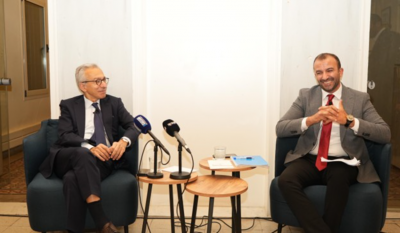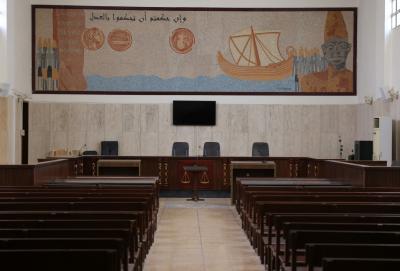In this fourth section of the second chapter of Dr. Nemer Freiha’s book The History Curriculum and Its Textbooks: A Testimony for History, the former president of the Educational Center for Research and Development recounts the consequences of the controversy surrounding the third-grade history book.
The minister summoned me and the members of the committee to his office on October 8, 2001, to discuss the book that had sparked heated debate. Surprisingly, he also invited representatives of teachers’ unions, even though we, as committee members, believed the meeting was meant only for those directly involved in authoring or reviewing the book. Attendees then heard sarcastic remarks about the historical facts presented in the text—remarks made by people with no expertise in history. I objected strongly, and a record of the meeting was filed.
The minister was outraged by several elements in the book: the French nationality of Taha Hussein’s wife; Abdelkader al-Jazairi accepting a French medal for protecting the Christians of Damascus in 1860; and Hassan Kamel al-Sabbah’s forced conscription into the Ottoman army. These are established historical facts that cannot be erased to suit the whims of one official or another. The book also featured the biographies of thinkers and figures who had dedicated their lives to serving Lebanon or humanity at large—intended as exemplary models for students. What, then, did the minister want the authors to write?
One committee member asked the minister what he wished to do with the lesson. He replied that he wanted to remove the timeline mentioning the “Arab conquest.” At that point, the committee suggested scrapping the entire lesson and rewriting it for the following year to eliminate any ambiguity. The minister then turned to me and demanded to see the fourth-, fifth-, and sixth-grade textbooks, which he had been told were already in print.
I explained that the fourth- and sixth-grade books were indeed being printed, while the fifth-grade text was still under review by the advisory board. The first two were already in the final proofing stage, and I offered to request them from the printer the next day for his review. He promised to return them within 48 hours, adding that if he had comments, he would send them back with these copies. True to my word, the books were delivered the following morning. But days turned into weeks, and then into years. Thirteen years later, those two books were still in the minister’s possession.
Later, the minister appeared on television, showering the center with “praise” by accusing it of producing books riddled with errors and making other baseless claims. He echoed what a group of habitual gossipers—some from the ministry, others from the center—had told him. These individuals, known by name to many, specialized in fabricating stories to feed to the minister. It was shocking to see people entrusted with shaping future generations sink to such low abyssal levels. I was compelled to respond through the press, not to descend into media bickering, but to defend the center and its mission, which was above such pettiness. At the time, the institution was an active workshop, managing numerous projects and producing textbooks for the third, sixth, and ninth grades of basic education, as well as the third year of secondary education across all four tracks.
Before the “history crisis,” more than 200 university professors, secondary-school teachers, and educational experts had worked tirelessly to ensure all textbooks would be ready before the school year began. Meanwhile, the minister and his entourage seemed more interested in obstructing the process in order to prove to the public that he was the ultimate authority in education. Yet education is not a stage for flexing political muscle—it is a field meant for intellectual contributions and academic achievements that serve students, not individual egos.
The center’s defense against the smear campaign did not convince the majority, particularly since it was not a personal defense but one of an institution. Instead, several MPs and former MPs attacked the center and its president. One even sought to “clear his name” by demanding my prosecution. I almost wished this had happened, so I could expose the hypocrisy and violations of those meddling in the textbook issue. But his request was rejected.
Inside the ministry, rumors circulated that the minister intended to dismiss me, especially after the president and the prime minister agreed to fill administrative vacancies by giving ministers the right to appoint directors-general of their choosing—turning public administration into little more than a social club where ministers could sit with their preferred directors and entourages, expecting personal benefits in return.
I considered going directly to the president to inform him of what was happening. Encouraging me to do so was an earlier meeting we’d had at Baabda Palace, where I explained the unjustified harassment I was facing for insisting on upholding the law and respecting the powers it granted me, while the minister sought to meddle in areas outside his remit. I added that my colleagues all had political backers shielding them from pressure, whereas I had none because I refused to align myself with any faction. The president reassured me: “I am your reference point. Do not fear anyone’s overreach.” At the end of our cordial meeting, he handed me a card with his name and several phone numbers, three of them highlighted in yellow. “Keep this card,” he told me, “and if anyone crosses the legal line with you, call me directly.”
In the height of the history book battle, I had no reference left but the president himself—or so I thought. I had tried to meet with several politicians to clarify the facts and suggest ways to address the so-called “errors” the minister claimed existed. Yet, to my astonishment, three out of four canceled their appointments through their offices. Did they fear the minister of education if they sat down with me? Was I now considered a “national virus” because the book I oversaw taught third-graders about Lebanon’s independence—a subject the authorities themselves seemed embarrassed to acknowledge at the time? Or were they afraid of the Syrians?
Eventually, I decided to explain the matter in full to the president, particularly since he had personally asked me to turn to him whenever necessary. I called one of the numbers on the card he had given me, and one of his aides answered. I introduced myself, explained that the president had asked me to contact him when needed, and requested an urgent appointment to present him with the history books and clarify the issues raised by the minister. The aide promised to inform the president and call me back. Days passed with no response. I tried several times from my private phone, but no one answered. The message was clear: even the president now refused to hear my side of the story—despite having said he was my reference.
Did the president, too, fear the minister? I will say no more.
Please post your comments on:
[email protected]
 Politics
Politics













